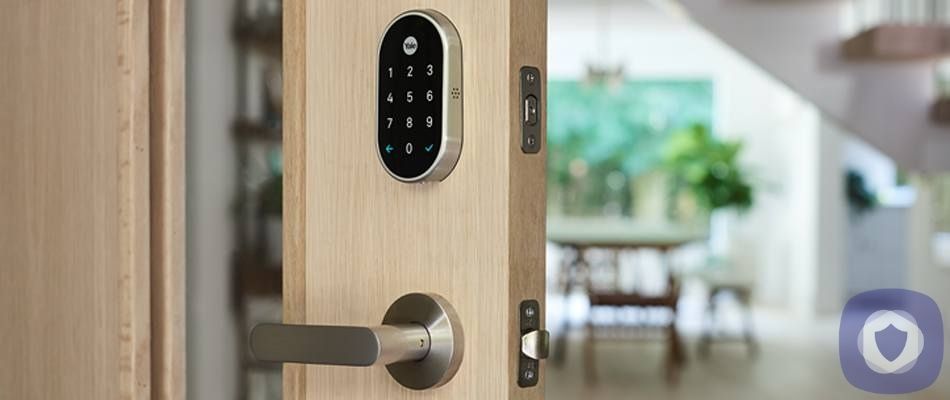If you’re looking to outsmart criminals or up the high-tech factor in your home, you may want to consider a smart lock. These locks, which eliminate the need for physical keys and can be controlled via an app on your phone, offer convenience (no more digging through your bag for keys!) and an extra layer of home security.
As the technology in this market continues to evolve, the locks keep getting smarter and smarter, and they’re an increasingly popular choice for people looking to protect their homes and families. In fact, reports predict that the smart lock market will hit $2.67 billion in by 2023, which is more than double its $1.28 billion performance in 2017. In other words, smart locks are here to stay.
What is a smart lock?
All door locks, from those old-fashioned ones that open with a skeleton key to the more modern, high-tech smart locks, have two parts—a locking mechanism to secure the door and a key. That key, however, doesn’t always have to be physical. For example, in the case of electronic locks, the lock is opened via electrical circuits.
Smart locks are a type of electronic locks that use Bluetooth, Wi-Fi or both to provide virtual control of the lock through an app on your mobile device. They range in price from about $100-300 and run on batteries.
Retrofit options are designed to be placed over your existing deadbolt and are fairly simple to install. Most, however, are installed in place of your existing deadbolt. In that case, the installation is a bit more involved, but those also typically offer more features and functionality.
What’s the difference between an electronic lock and a smart lock?
As we mentioned, smart locks are, in fact, electronic locks. The difference between these and traditional, “dumb” electronic locks is that the latter don’t connect to Wi-Fi or Bluetooth and can’t be controlled via an app. Traditional electronic locks typically come with a keypad and open once the correct code is entered. Others operate with a key fob or access cards. Most also can be used with a traditional key.
Smart locks, on the other hand, operate wirelessly, using Wi-Fi and or Bluetooth technology so they can be controlled virtually from anywhere in the world that you have a Wi-Fi connection. Some smart locks may also feature a keypad, but they will still operate via Wi-Fi or Bluetooth, in addition to that keypad.
What can smart locks do?
Various locks offer different features, but here are some of the primary things smart locks can do:
They can provide easier and safer access
No more hiding keys for your cleaning crew or dog walker. These locks let you grant access to your home via an access code, which you can change at any time. You don’t have to worry about extra keys floating around or fret over lost keys. Anytime anyone needs in, you can grant them access with a tap on your app. You can set parameters as to how long those access codes work too. For example, you might want to give your dog walker a key code that works only between the hours of 1-2 p.m.
They help you monitor who’s coming and going
Some smart locks also allow you to monitor who’s coming and going from your home and how long they stay there. Some also work with smart doorbells and cameras so you can see what’s going on while they’re in your home as well. Many smart locks also allow you to monitor if the door is locked or unlocked, which means no more worrying about if you forgot to lock the door (again!).
Some locks integrate with other smart home products
Many smart locks can be integrated with other smart home products. That means you can also control your locks with voice commands via your Alexa, Google Home or other smart home devices. For example, if someone rings your doorbell and you know who it is, you can say, “Alexa, unlock the front door,” and you don’t even have to get up from your couch to let them in.
They provide hands-free entry to your home
If you’ve ever stood at your front door, arms loaded down with bags and backpacks, desperately digging through your pockets for your keys, you know how frustrating that can be. With some smart locks, as long as you have your mobile device with you, the door will open automatically when you’re in range of the lock. In other cases, you will simply need to touch something within your app.
Should you purchase a smart lock for your home?
Smart locks are a great option to consider when looking for ways to secure your home, because they offer convenience, control and a peace of mind that traditional keys and locks can’t. They aren’t perfect, however, and consumers should weigh the pros and cons to determine if one is right for them.
Nerd Pros
Convenience
Above all, smart locks offer convenience. There’s no worrying about whether you forgot to leave a key out for someone or even about losing your own keys. Everything can be controlled via an app whether you are skiing the slopes, basking on a beach or just out running errands.
Added security
While there’s no guarantee that smart locks are safer than traditional locks, they do eliminate the need for risky behavior, such as leaving a key under your doormat for your neighbor when anyone could come and swipe it. Smart locks also eliminate the need for you to create and have multiple keys floating around, which you may sometimes not get back. Smart locks can be integrated with other home security products, such as doorbell cameras, that boost security as well.
Nerd Cons
Of course, there are also some potential drawbacks to weigh when considering if a smart lock is right for you.
Maintenance
If you have a traditional lock and key, there’s no maintenance required unless it breaks. Smart locks, however, require batteries, and you’ll likely have to perform software updates for the app. It’s not a ton of extra work, but some people would rather not be bothered with it, and there are also the problems that can occur if your phone battery dies or your power goes out and you don’t have a traditional key that can be used as a backup.
Vulnerable
While these locks offer an added level of security, they’re not 100-percent tamperproof. As with any wireless technology, there’s the possibility that hackers could compromise your system, and there have been reports of some security flaws in smart locks that make them vulnerable.
The bottom line
If you frequently have people coming to and from your house (think dog walkers, cleaners, kids, guests, etc.) and you want a bit of extra security and convenience, then a smart lock may be a great purchase. It’s one of those things you don’t need, but one that could potentially make your life a little easier and let you rest a little better when it comes to your home’s security.
This article has been reviewed and approved by Officer Banta.

Officer Banta is the official SecurityNerd home security and safety expert. A member of the Biloxi Police Department for over 24 years, Officer Banta reviews all articles before lending his stamp of approval. Click here for more information on Officer Banta and the rest of our team.

